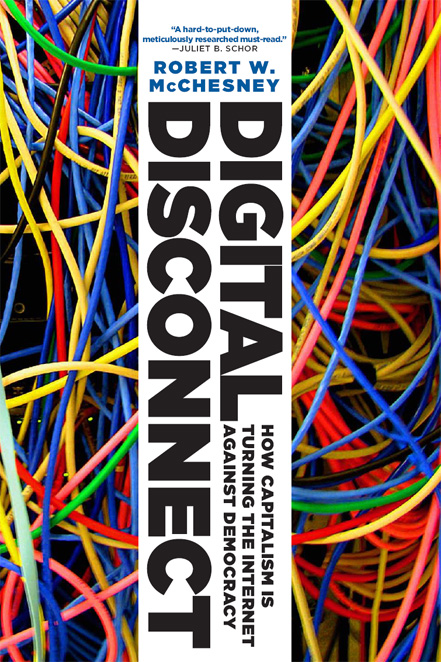
Digital Disconnect
How Capitalism is Turning the Internet Against Democracy
کتاب های مرتبط
- اطلاعات
- نقد و بررسی
- دیدگاه کاربران
نقد و بررسی

Starred review from February 25, 2013
Filtering the internet through a lens of political economy and free-market capitalism, acclaimed author and University of Illinois professor McChesney (Rich Media, Poor Democracy) presents a thorough and alarming critique of the corruption of one of the most influential inventions in human history. "People thought the Internet would be... a non-commercial zone, a genuine public sphere, leading to far greater public awareness, stronger communities, and greater political participation," McChesney observes. "To the contrary... the internet has been commercialized, copyrighted, patented, privatized, data-inspected, and monopolized." He deconstructs capitalism through its historical trends before painting a grim portrait of corporate concentration and monopolization; it reads like dystopian science-fiction where giants like Google, Facebook, Apple, Microsoft, and Amazon further entrench their market dominance, attempting to own consumers' "every waking moment," aided and abetted by lax government enforcement and deregulation. Such concentrated power brings with it a host of concerns; however, as McChesney cites, very little public opposition to such power can be expected as, "people care more about what unjustly harms them than what unjustly benefits them." Instead, we face the very real possibility of discovering the "digital revolution... to have been a revolution in name only"; the consequences of which are already revealing themselves.

February 15, 2013
A provocative and far-reaching account of how capitalism has shaped the Internet in the United States. Writing from a liberal viewpoint, McChesney (Communication/Univ. of Illinois; Communication Revolution: Critical Junctures and the Future of Media, 2007, etc.) argues that an economic system designed to produce "endless profits by any means necessary" has undermined the democratic potential of the Internet. "For all of the digital revolution's accomplishments, it has failed to deliver much of the promise that was once seen as inherent in the technology," he writes, echoing words that many readers will recall hearing about the failed early promise of TV broadcasting. Rather than becoming a noncommercial zone that builds greater political participation and ends widespread inequality and corporate monopolies, the Internet has been commercialized and monopolized. Drawing on the research of critics and scholars, the author traces the many ways in which wealthy interests have shaped the Internet and adversely affected American society, promoting inequality and hypercommercialism. Specific topics include the decline in enforcement of antitrust laws, the increase in patents on digital technology, and the dominance of Google, Microsoft and other firms. McChesney builds on his earlier work to detail the many ways in which the Internet has harmed professional journalism and limited the vital watchdog role of American newspapers, which have lost their allure for profit-seeking investors. The author concludes that reforms will not save the democratic promise of the Internet; rather, Americans must spur the rise of a new political economy based on nonprofit and noncommercial institutions. A valuable addition to the literature on the digital age.
COPYRIGHT(2013) Kirkus Reviews, ALL RIGHTS RESERVED.

























دیدگاه کاربران